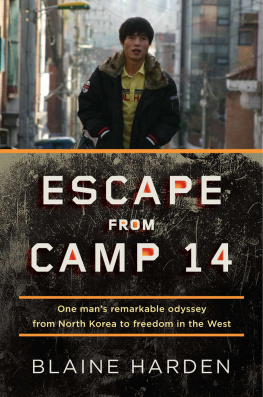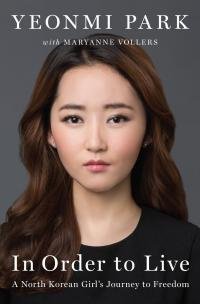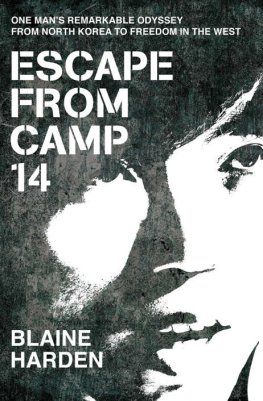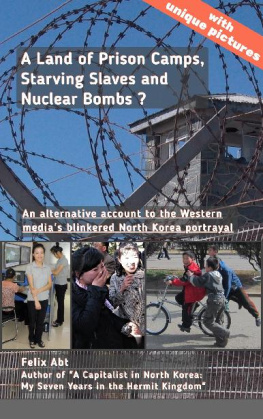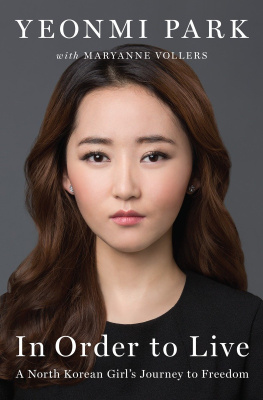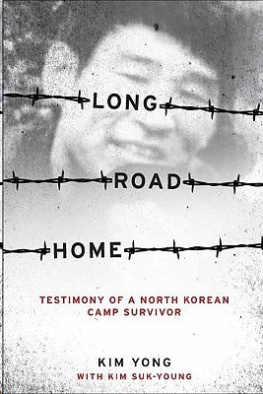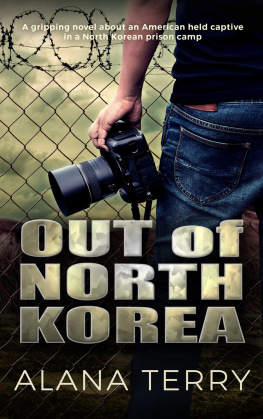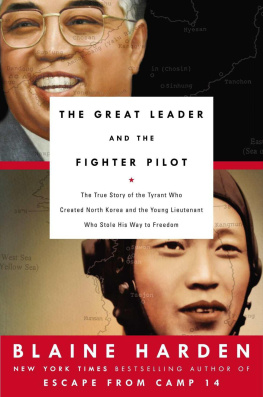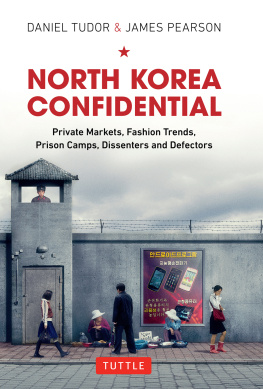ESCAPE FROM CAMP 14


VIKING
Published by the Penguin Group
Penguin Group (USA) Inc., 375 Hudson Street, New York, New York 10014, U.S.A. Penguin Group (Canada), 90 Eglinton Avenue East, Suite 700, Toronto, Ontario, Canada M4P 2Y3 (a division of Pearson Penguin Canada Inc.) Penguin Books Ltd, 80 Strand, London WC2R 0RL, England Penguin Ireland, 25 St. Stephens Green, Dublin 2, Ireland (a division of Penguin Books Ltd) Penguin Books Australia Ltd, 250 Camberwell Road, Camberwell, Victoria 3124, Australia (a division of Pearson Australia Group Pty Ltd) Penguin Books India Pvt Ltd, 11 Community Centre, Panchsheel Park, New Delhi 110 017, India Penguin Group (NZ), 67 Apollo Drive, Rosedale, Auckland 0632, New Zealand (a division of Pearson New Zealand Ltd) Penguin Books (South Africa) (Pty) Ltd, 24 Sturdee Avenue, Rosebank, Johannesburg 2196, South Africa
Penguin Books Ltd, Registered Offices:
80 Strand, London WC2R 0RL, England
First published in 2012 by Viking Penguin,
a member of Penguin Group (USA) Inc.
10 9 8 7 6 5 4 3 2 1
Copyright Blaine Harden, 2012
All rights reserved
Photograph and drawing credits
Insert page 1 (top), 2 (bottom) (photo of government image), 3 (top and bottom) (photos of paintings), 6 (top), 7 (top), 8: Photos by Blaine Harden
1 (bottom): Kyodo via AP Images
2 (top): Korean Central News Agency / Korea News Service via AP Images
4 and 5 (six drawings): From Escape to the Outside World by Shin Dong-hyuk, courtesy of the publisher, Database Center for North Korean Human Rights
6 (bottom): Jennifer Cho
7 (bottom): Courtesy of Lowell and Linda Dye
LIBRARY OF CONGRESS CATALOGING IN PUBLICATION DATA
Harden, Blaine.
Escape from Camp 14 : one mans remarkable odyssey from North Korea to freedom in the West / Blaine Harden.
p. cm.
Includes bibliographical references.
ISBN: 978-1-101-56126-3
1. Shin, Dong-hyuk. 2. Political prisonersKorea (North)Biography. 3. Concentration campsKorea (North) 4. Forced laborKorea (North) 5. Korea (North)Social conditions. I. Title.
HV9815.6.H37 2012
365.45092dc23
[B]
2011037555
Printed in the United States of America
Set in Warnock Pro with Foundry Gridnik
Designed by Daniel Lagin
Maps by Jeffrey L. Ward
No part of this book may be reproduced, scanned, or distributed in any printed or electronic form without permission. Please do not participate in or encourage piracy of copyrighted materials in violation of the authors rights. Purchase only authorized editions.
ALWAYS LEARNING
PEARSON
For North Koreans who remain in the camps
There is no human rights issue in this country, as everyone leads the most dignified and happy life.
[North] Korean Central News Agency, March 6, 2009


PREFACE
A TEACHABLE MOMENT
H is first memory is an execution.
He walked with his mother to a wheat field near the Taedong River, where guards had rounded up several thousand prisoners. Excited by the crowd, the boy crawled between adult legs to the front row, where he saw guards tying a man to a wooden pole.
Shin In Geun was four years old, too young to understand the speech that came before that killing. At dozens of executions in years to come, he would listen to a supervising guard telling the crowd that the prisoner about to die had been offered redemption through hard labor, but had rejected the generosity of the North Korean government. To prevent the prisoner from cursing the state that was about to take his life, guards stuffed pebbles into his mouth, then covered his head with a hood.
At that first execution, Shin watched three guards take aim. Each fired three times. The reports of their rifles terrified the boy and he fell over backward. But he scrambled to his feet in time to see guards untie a slack, blood-spattered body, wrap it in a blanket, and heave it into a cart.
In Camp 14, a prison for the political enemies of North Korea, assemblies of more than two inmates were forbidden, except for executions. Everyone had to attend them. The labor camp used a public killingand the fear it generatedas a teachable moment.
Shins guards in the camp were his teachersand his breeders. They had selected his mother and father. They taught him that prisoners who break camp rules deserve death. On a hillside near his school, a slogan was posted: ALL ACCORDING TO THE RULES AND REGULATIONS . The boy memorized the camps ten rules, The Ten Commandments, as he later called them, and can still recite them by heart. The first one stated: Anyone caught escaping will be shot immediately.
Ten years after that first execution, Shin returned to the same field. Again, guards had rounded up a big crowd. Again, a wooden pole had been pounded in the ground. A makeshift gallows had also been built.
Shin arrived this time in the backseat of a car driven by a guard. He wore handcuffs and a blindfold fashioned from a rag. His father, also handcuffed and blindfolded, sat beside him in the car.
They had been released from eight months in an underground prison inside Camp 14. As a condition of their release, they had signed documents promising never to discuss what had happened to them underground.
In that prison within a prison, guards tried to torture a confession out of Shin and his father. They wanted to know about the failed escape of Shins mother and only brother. Guards stripped Shin, tied ropes to his ankles and wrists, and suspended him from a hook in the ceiling. They lowered him over a fire. He passed out when his flesh began to burn.
But he confessed nothing. He had nothing to confess. He had not conspired with his mother and brother to escape. He believed what guards had taught him since his birth inside the camp: He could never escape and he must inform on anyone who talks about trying. Not even in his dreams had Shin fantasized about life on the outside.
Guards never taught him what every North Korean schoolboy learns: Americans are bastards scheming to invade and humiliate the homeland. South Korea is the bitch of its American master. North Korea is a great country whose brave and brilliant leaders are the envy of the world. Indeed, he knew nothing of the existence of South Korea, China, or the United States.
Unlike his countrymen, he did not grow up with the ubiquitous photograph of his Dear Leader, as Kim Jong Il was called. Nor had he seen photographs or statues of Kims father, Kim Il Sung, the Great Leader who founded North Korea and who remains the countrys Eternal President, despite his death in 1994.
Although he had not been important enough for brainwashing, Shin had been schooled to inform on his family and on his classmates. He won food as a reward and joined guards in beating up children he betrayed. His classmates, in turn, tattled on him and beat him up.
When a guard removed his blindfold, when he saw the crowd, the wooden pole, and the gallows, Shin believed he was about to be executed.
No pebbles, though, were forced into his mouth. His handcuffs were removed. A guard led him to the front of the crowd. He and his father would be spectators.

